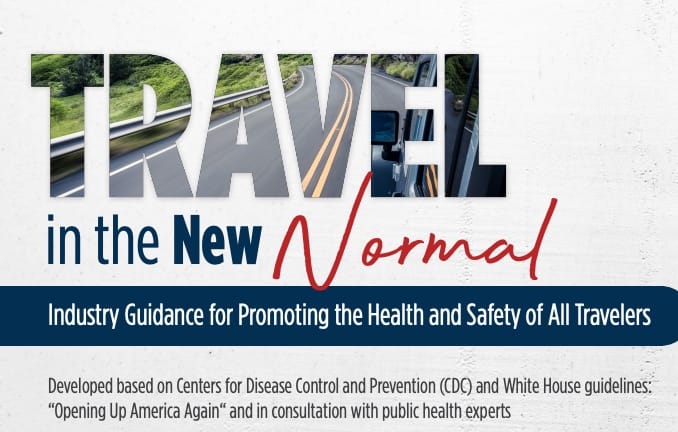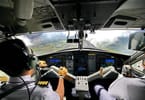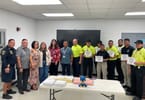Projections are 200,000 infections a day in the United States according to a story released in the New York Times this morning. The US Travel Association, however, issues the official guidelines called: “Travel in the new normal.”
Following a collaboration between medical experts and a broad array of businesses and organizations, the U.S. travel industry submitted to the White House and governors a document containing detailed îndrumare for travel-related businesses to help keep their customers and employees safe as the country emerges from the COVID-19 pandemic.
Intitulat „Călătoriți în noua normalitate”, documentul descrie măsuri viguroase pe care industria călătoriei le va urma pentru a reduce riscul de COVID-19 și pentru a ajuta la comunicarea în fiecare etapă a călătoriei călătorului. Scopul: să permită călătoriei să se reia în siguranță pe măsură ce statele și municipalitățile relaxează ghidarea fizică de distanță.
“We want political leaders and the public alike to see that our industry is setting a very high standard for reducing the risk of coronavirus in our businesses and that the practices in place to achieve that standard are consistent through every phase of the travel experience,” said U.S. Travel Association President and CEO Roger Dow. “As travel reopens, travelers need the confidence that safety measures are in place from their departure to their return home.”
Industria turismului a fost afectată în special de criza sănătății publice; Se estimează că industria a pierdut opt milioane de locuri de muncă începând cu primul mai, iar impactul economic al coronavirusului legat de călătorii se estimează a fi de nouă ori mai rău decât 9/11.
Bunăstarea angajaților și a oaspeților este întotdeauna prioritatea nr. 1 a companiilor de turism, a spus Dow. Dar un obiectiv secundar al ghidului „Călătorie în noua normalitate” este de a restabili încrederea consumatorilor în procesul de călătorie, în speranța că cererea de călătorii va reveni rapid și industria poate ajuta la o recuperare economică și a locurilor de muncă solide.
„Nu vom încuraja oamenii să călătorească până când experții și autoritățile din domeniul sănătății publice nu vor arăta clar că este momentul potrivit pentru a face acest lucru”, a spus Dow. „Industria noastră se concentrează pe pregătirea pentru acel moment și pe demonstrarea faptului că pregătirile noastre sunt cuprinzătoare și informate de consilii experților de top.
„Capacitatea de a călători liber nu este doar o parte fundamentală a modului de viață american, dar, de asemenea, susține existența a milioane“, a spus Dow. „Suntem foarte hotărâți să ne întoarcem la călătorii și la noul normal cât de repede ne vor permite circumstanțele.”
Ghidul „Călătoriți în noul normal” se concentrează pe șase domenii principale, documentul furnizând exemple specifice pentru fiecare:
- Companiile de turism ar trebui să adapteze operațiunile, să modifice practicile angajaților și / sau să reproiecteze spațiile publice pentru a ajuta la protejarea angajaților și a clienților.
- Companiile de turism ar trebui să ia în considerare implementarea de soluții fără atingere, acolo unde este posibil, pentru a limita oportunitatea de transmitere a virusului, permițând totodată o experiență de călătorie pozitivă.
- Companiile de turism ar trebui să adopte și să implementeze proceduri de salubrizare îmbunătățite special concepute pentru a combate transmiterea COVID-19.
- Companiile de turism ar trebui să promoveze măsuri de depistare a sănătății pentru angajați și să izoleze lucrătorii cu posibile simptome COVID-19 și să ofere clienților resurse de sănătate.
- Companiile de turism ar trebui să stabilească un set de proceduri aliniate cu îndrumările CDC în cazul în care un angajat va da rezultate pozitive pentru COVID-19.
- Companiile de turism ar trebui să urmeze cele mai bune practici în domeniul serviciilor alimentare și de băuturi pentru a promova sănătatea angajaților și a clienților.
„Ghidul„ Călătoriți în noul normal ”- precum și întregul efort de a produce această lucrare - poate servi drept model de colaborare între mediul de afaceri și comunitățile medicale care creează o cale spre vindecarea atât a sănătății publice, cât și a economiei” Spuse Dow. „Cele mai profunde mulțumiri tuturor organizațiilor care au colaborat împreună în dezvoltarea sa și tuturor celor care vor fi esențiali pe măsură ce ne îndreptăm spre recuperare.
„Această colaborare este ceva care ar trebui să-i ajute pe clienții noștri, afacerile noastre și industria în ansamblu să treacă dincolo de cea mai provocatoare perioadă cu care s-a confruntat vreodată unul dintre noi.”
The document:
OVID-19 represents an unprecedented challenge to the travel industry. After 9/11, industry leaders said, “without security, there will be no travel.” The global pandemic adds a new dimension to our age of global travel, demanding a comprehensive response:
Without guidance to promote the health and safety of travelers, there will be no travel, no sustainable reopening of our businesses, and no revival of our economy.”
As we move to the next phase of our response to the pandemic, we must demonstrate leadership to elected officials and public health authorities who will decide when, how and under what conditions travel businesses are allowed to reopen across America. Just as importantly, we must also inspire confidence in travelers by demonstrating travel businesses are appropriately focused on their health and safety. To meet these objectives, the travel industry—hotels, resorts, airports, airlines, attractions, restaurants, retail, rental cars, meeting venues, event producers, travel advisors, cruise lines, vacation rentals etc.— has come together, working with health and medical experts, to reach a collective agreement on a core set of health and safety guidance that the industry may adapt to their businesses. They build upon and align with the White House and CDC evidence-based guidelines for “Opening Up America Again.
” This guidance provides our customers with an understanding of the key practices across America’s travel industry. This guidance reflects the role of the travel industry in promoting the health and safety of our customers and employees. But no industry can overcome this challenge alone. Travelers must also follow health guidelines to do their part to help protect their families and those around them. We must all work together. The embrace of this guidance by the various segments of the travel industry signals how seriously we take COVID-19 and the threat it presents.
Our collective response and desire to tailor this guidance to our businesses demonstrate our industry’s commitment to do its part toward promoting the health of our employees and customers.
This travel industry guidance assumes a phased approach to reopening travel. Our guidance not only directly responds to the COVID-19 threat we face today—but it also prepares our industry to handle future threats that may arise. For instance, in the earliest stages of reopening, travel businesses will reinforce CDC travel guidance as to vulnerable individuals. Travel industry guidance may, of course, evolve and be updated as the nation moves through different stages of reopening, as the science and data become clearer, and as the known efficacy of certain practices progress.
Collaborating with medical experts has been a critical component to the development of this travel industry guidance. Expertise in Infectious diseases, preventative, and occupational medicine led to the various facets of the travel experience being viewed through a lens of how best to minimize the spread of Covid-19.
Using a layered approach to health and safety, the guidance reinforces various combined measures such as employee and traveler physical distancing, hand hygiene, personal protective equipment (PPE), and behaviors before and during the travel continuum. As this guidance adapts and evolves, the travel industry will continue to seek input from trusted medical sources to reflect the latest developments within and guidance from the professional health community.
- Travel businesses should adapt operations, modify employee practices, and/or redesign public spaces to help protect employees and customers.
Travel businesses should adopt or establish a strategy designed to reduce risks of COVID-19 transmission. Depending on the business, that strategy could include operational changes, new employee practices, or reimagining high-traffic public spaces. Strategies should align with CDC guidance and build confidence to travelers and industry employees that their health and safety is our top priority.
For some businesses, these strategies will include practices such as: Reinforcing hand hygiene which can decrease the risk of transmission of respiratory viruses by ~50%; Utilizing personal protective equipment (PPE) such as masks and gloves; Installing physical barriers, such as transparent screens to provide proper separation between customers and employees;
Encouraging physical distancing by posting new signage to ensure proper separation in lines and common areas, discouraging congregating in crowded areas, reconfiguring public spaces, or limiting the number of employees and customers in various areas;
Thinking creatively to limit staff physical contact with customers where practical while still delivering superior service, for example, through online ordering, curbside service delivery, automated entrances and other practices; Educating both employees and customers about their shared responsibility to help protect each other in a COVID-19 environment.
2) Travel businesses should consider implementing touchless solutions, where practical, to limit the opportunity for virus transmission while also enabling a positive travel experience. This could mean implementing touchless or low-touch solutions, along with pursuing technological and innovative practices to further promote safe and enjoyable experiences.
Such measures may include adopting contactless technologies or procedures for: Ticketing; Identification;
Check-in; Payment for goods and services; Automated ordering and pick-up for food and services; and A broader range of travel and hospitality amen.
3) Travel businesses should adopt and implement enhanced sanitation procedures specifically designed to combat the transmission of COVID-19.
Protecting against COVID-19 requires heightened sanitation practices. In an industry as diverse as travel, specific practices may vary from one segment to another.
Each travel business will continue to tailor procedures to its own operating environment and the expectations of its customers. Some may also adopt practices verified by third-party certification services.
But sanitation procedures will align with leading public health authority guidelines. To promote the health and safety of our customers and employees, every segment of the travel industry should deploy enhanced sanitation procedures that include: Establish a policy implementing more frequent hand washing by all employees and, in the absence of hand washing, make frequent use of an alcohol-based hand sanitizer (at least 60% alcohol); Sanitizing more frequently, using products and disinfectants that meet requirements for effectiveness against COVID-19; special attention to high-touch surfaces;
Providing hand sanitizer in public areas throughout facilities; Modifying business hours when necessary to carry out thorough sanitation and disinfection procedures; Providing new training for employees on implementing these measures with oversight on execution; Researching technological innovations and testing new procedures, as appropriate, to enhance sanitation.
4) Travel businesses should promote health screening measures for employees and isolate workers with possible COVID-19 symptoms and provide health resources to customers.
Travel businesses should adopt health screening procedures that require all employees: To monitor their health; To not report to work if they are ill and/or showing any symptoms; and To self-isolate, if showing symptoms of COVID-19, is awaiting test results, or if diagnosed with COVID-19.
Travel employers and operators should review their policies to more easily enable employees to stay home when sick or when possibly exposed to the coronavirus. This could also include, for some, updating sick leave policies and allowing employees to stay home to care for sick family members or to fulfill self-isolation requirements.
Travelers also have a role to play in preventing the spread of COVID-19. To help them fulfill this responsibility, travel businesses should offer appropriate resources to customers to better enable them to monitor and screen their own health, including
Signage communicating COVID-19 symptoms;
Guidance to local public health resources in case testing or treatment is needed; Materials describing good health practices to protect themselves and others; Communications encouraging travelers to stay home if they are sick and to postpone travel until they are well.
5) Travel businesses should establish a set of procedures aligned with CDC guidance should an employee or customer test positive for COVID-19.
Should an employee or customer test positive, travel businesses follow an appropriate checklist of actions in response? Travel businesses should follow guidance from leading public health authorities to define necessary actions in these instances.
6) Travel businesses should follow best practices in food and beverage services to promote the health of employees and customers.
While COVID-19 is not a foodborne illness, food, and beverage service is an essential and ubiquitous part of the hospitality our industry provides to travelers. When serving food and beverages, travel businesses should follow FDA’s Best Practices for Retail Food Stores, Restaurants, and Food Pick-Up/Delivery Services During the COVID-19 Pandemic and the National Restaurant Association’s COVID-19 Re-Opening Guidance. They should also review the National Restaurant Association’s longstanding ServSafe guidelines or comparable state program.
A shared responsibility
Responding effectively to COVID-19 is a shared responsibility.
Our guidance reflects the essential role the travel industry must play to help promote the health and safety of our customers and employees. But no industry can overcome this challenge alone. Travelers also have a responsibility. They must adopt new travel practices and follow science-based guidelines to help protect the health of their family and those around them, including fellow travelers and industry employees. In the spirit of collective action needed to defeat COVID-19, we urge travelers to do their part and follow government and industry guidance to help protect themselves and others. By working together, we can overcome the challenge, begin to reopen our economy and responsibly get America traveling again.
Who is included in this document:
The following organizations show their support of this travel industry guidance, which will be shared with the entire travel industry and expanded upon by each sector as necessary. These organizations and their members, described below, represent the majority of the $2.6 trillion U.S. travel industry.
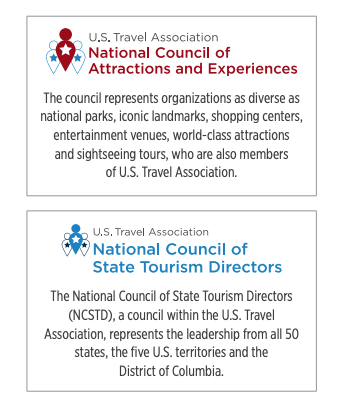
ecranul 2020 05 04 la 07 27 56
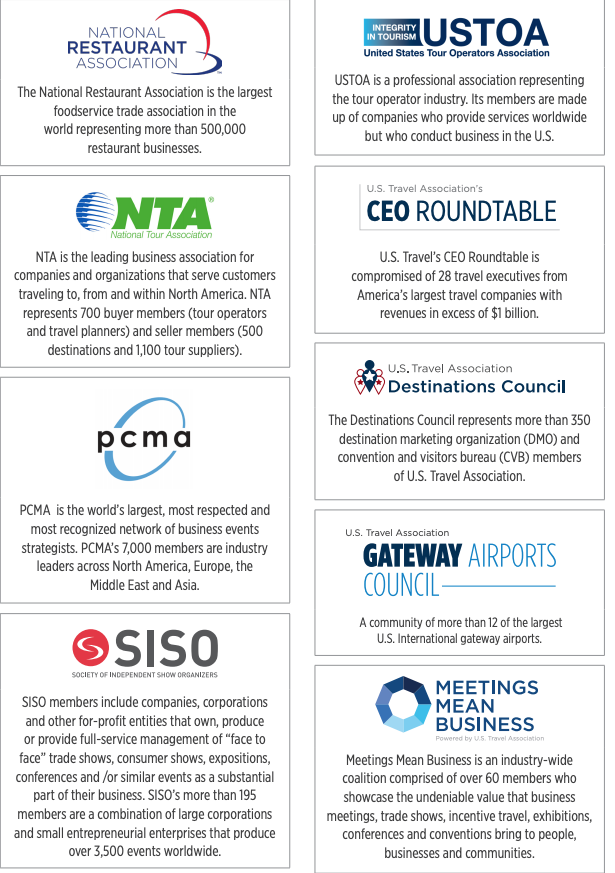
ecranul 2020 05 04 la 07 27 46
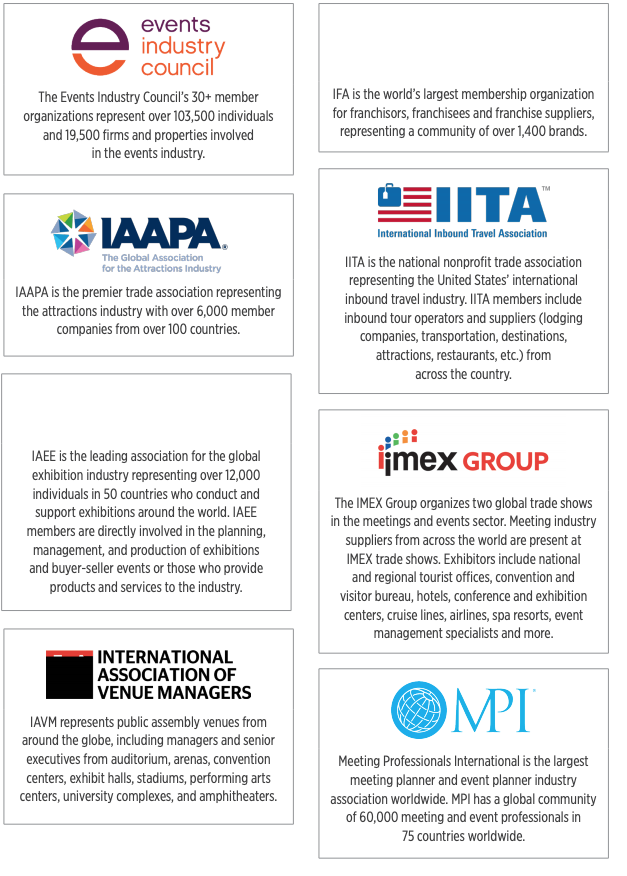
ecranul 2020 05 04 la 07 27 34
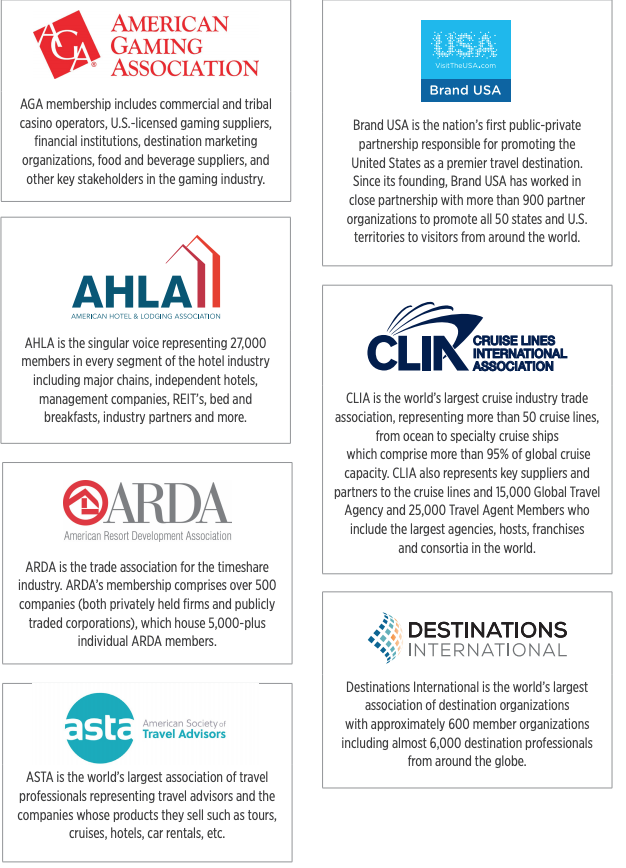
ecranul 2020 05 04 la 07 27 24
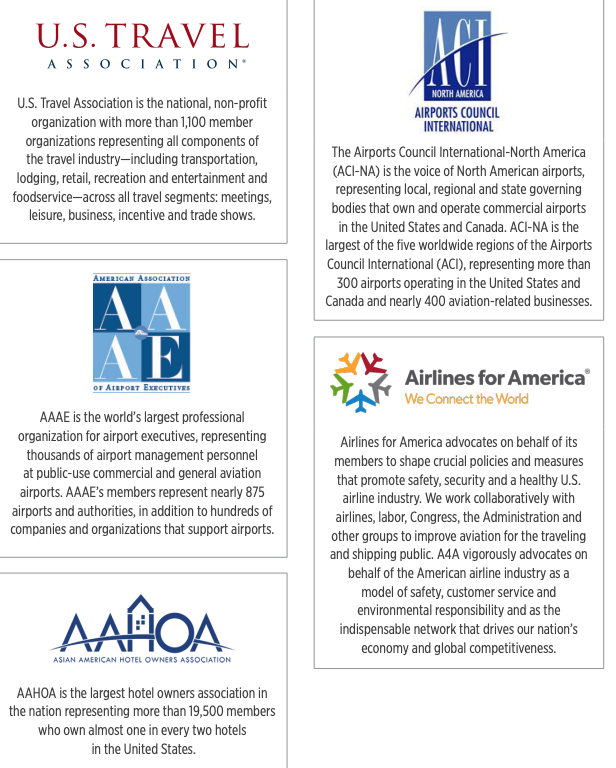
ecranul 2020 05 04 la 07 27 13
CE ESTE DE LUAT DIN ACEST ARTICOL:
- “We want political leaders and the public alike to see that our industry is setting a very high standard for reducing the risk of coronavirus in our businesses and that the practices in place to achieve that standard are consistent through every phase of the travel experience,”.
- travel industry submitted to the White House and governors a document containing detailed guidance for travel-related businesses to help keep their customers and employees safe as the country emerges from the COVID-19 pandemic.
- Guidance—as well as the entire effort to produce this work—can serve as a model for collaboration between the business and medical communities that forges a path toward healing both the public health and the economy,”.

